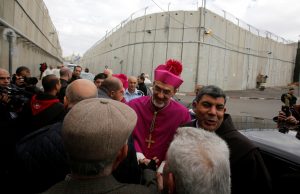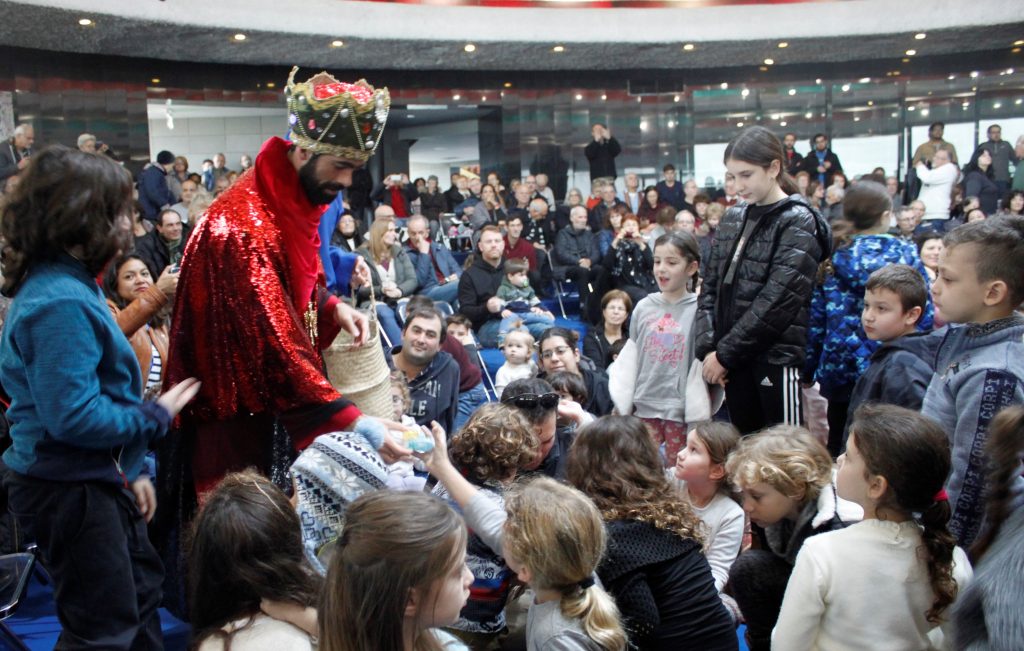In much of the world, Christmas is as much a cultural holiday as it is a religious one: bright lights, time off work, and wrapped presents don’t require much belief in anything.
Not so in the land of Jesus’ birth.
Christians — Catholics, but also many Orthodox — make up just 1% of the population in Israel and Palestine. For the rest, Christmas is “a normal weekday,” in the words of Archbishop Pierbattista Pizzaballa, spiritual leader of the region’s Latin-rite Catholics.
As always, the days of Christmas are a telling example of the increasingly awkward — and eternally complicated — situation faced by Christians there year-round.
Christian believers living in Israel, Palestine, Jordan, and Cyprus — which together comprise the Latin Patriarchate of Jerusalem, the diocese that Archbishop Pizzaballa has led since 2016 — live in what he calls “a sense of solitude.”
“Being a small number, with a lot of struggles … it’s not easy to find support,” Archbishop Pizzaballa told Angelus in an interview during a visit to the U.S. in November.
Originally from Northern Italy, the 57-year-old Franciscan has spent the last three decades serving in the Holy Land. As patriarch, he leads Catholics every Christmas Eve in a procession from Jerusalem to the Church of the Nativity in Bethlehem, built over the spot where Jesus is believed to have been born to the Virgin Mary. Part of the six-mile trek is done walking, another driving (with a security checkpoint in between). The day’s festivities, which attract crowds of pilgrims from around the world as well as local dignitaries like the city’s mayor, culminate in Midnight Mass on the basilica grounds.
The holidays are an especially important part of the year for the tourism industry, which many Christians in the Holy Land depend on for survival. When the COVID-19 pandemic halted almost all religious travel in the region for months, Catholic aid organizations had to step in to help struggling families. Others had to rely on their savings.
“We tried to help as much as we could,” said Archbishop Pizzaballa.
Last Christmas, tourism levels were about “half and half,” said the prelate. This year, it’s “full normality,” with all health restrictions dropped and pilgrimage groups arriving in numbers close to pre-pandemic levels.
But from Archbishop Pizzaballa’s point of view, it’s been an uneasy recovery: The number of Christians in the Holy Land is shrinking, with the struggling economy pushing many youths to look for jobs abroad. According to figures cited by Archbishop Pizzaballa during a presentation to the U.S. bishops at their annual meeting in Baltimore last month, half of the population in Palestine and Jordan are under the age of 25.
“Little by little, the best part of society, they are leaving,” the patriarch told the bishops. “The middle class is shrinking. It’s becoming more and more difficult to make the Christian character of the Holy Land visible.”

Christians in the region try to stay together, but for families who want to “preserve the Christian context of life also for their children,” sticking it out is becoming increasingly difficult, Archbishop Pizzaballa told Angelus.
The precariousness is compounded by political tensions. According to figures cited by the Associated Press, 2022 has been the deadliest year in Israeli-Palestinian violence in the West Bank and East Jerusalem since 2006. Many Christians are worried about even more violence as a result of a new coalition government of far-right parties set to take power in Israel, Msgr. William Shomali, vicar general for the patriarchate, told Aid to the Church in Need in a Dec. 13 interview.
“The two-state solution is now near death, and risks being buried,” said Msgr. Shomali of the political dream — long supported by the Holy See and peace advocates — that Israel and Palestine could one day co-exist as neighboring countries.
Beyond the practical hardships, Christmas still serves as an occasion of unity among the Christians of the various Catholic and Orthodox rites in the region. Archbishop Pizzaballa has the custom of personally exchanging Christmas greetings with the several other Christian patriarchs in the region.
In the town of Nazareth, another Christmas-time tourist hotspot where some 20% of the population is Christian, the tensions are less visible, said Sara Fornari, an Italian journalist based in Nazareth with Catholic radio network Radio Maria. Secular Jews especially “show a lot of interest in the beauty, especially the beauty of the Christian liturgy, of the Christian feasts.”
For example, the city’s giant Christmas tree near Mary’s Well — said to be one of the biggest in the Middle East — is a favorite selfie spot for Muslims and Jews, said Fornari.
On the other side of Galilee, the Domus Galilaeae, a Catholic retreat center on the Mount of Beatitudes, hosts a large-scale Epiphany event, complete with Christmas carols and a visit from the three Wise Men and their camels. Every year, the celebration draws hundreds of Jewish neighbors with their children.
According to Fornari, events like those underline the crucial role that the shrinking “remnant” of Christians has to play in the Middle East.
“The Christian presence here, even if small, can be a very important sign if they live out values that others don’t have,” said Fornari. “But that’s what it all comes down to: whether we Christians actually live as authentic Christians.”

